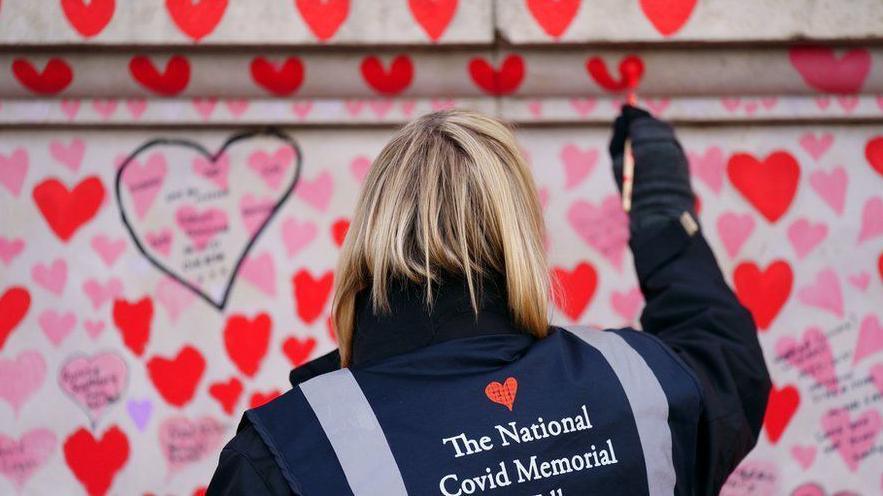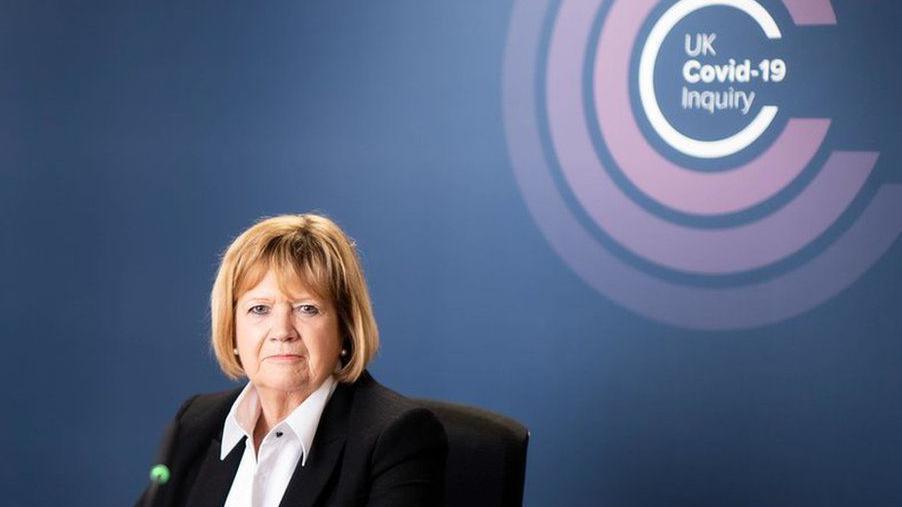UK 'failed citizens' with flawed pandemic plans

- Published
Significant flaws in the UK’s pandemic planning meant Covid caused more deaths and economic costs than it should have, the first report of the Covid Inquiry says.
The 217-page report called for radical reform of the systems, saying the UK government and devolved nations “failed their citizens”.
It said the UK planned for the wrong pandemic – a mild one where spread of a new virus was inevitable - and this led to the UK turning to “untested” lockdowns.
Part of the blame, it said, was groupthink by scientists and too little challenge from ministers.
However, it also pointed out the UK lacked resilience – with high rates of ill-health and public services running close to, if not beyond, capacity.
By the end of 2023, 235,000 people had died with Covid.
This is the first of at least nine inquiry reports covering everything from political decision-making to vaccines.
Inquiry chair Baroness Hallett said the UK was “ill-prepared for dealing with a catastrophic emergency, let alone the coronavirus pandemic”.
“Never again can a disease be allowed to lead to so many deaths and so much suffering,” she added.
Her report makes a series of recommendations, including:
Taking responsibility for pandemic planning away from the Department of Health and Social Care, which leads for the UK
Creating a ministerial-level body in each nation, chaired by the leader or deputy leader, with responsibility for all types of civil emergency that every department feeds into
A new independent body to advise on civil emergencies and assess the state of preparation and resilience, which includes both socio-economic and scientific expertise
Three-yearly pandemic response exercises to stress-test plans in place
Baroness Hallett said she wants to see her recommendations acted on quickly, with many in place within six months or a year.
“The expert evidence suggests it is not a question of if another pandemic will strike, but when," she added.
'They failed everyone'
The families and loved-ones of those who died from Covid have welcomed publication of the report.
Prof Naomi Fulop, a spokeswoman for the Covid 19 Bereaved Families for Justice group , said the report was “hard-hitting and clear-sighted” and urged the new government to adopt the recommendations.
However, she said the inquiry did not go far enough in terms of what undermined the UK’s ability to respond – the inequalities within society and the state of public services.
“Even the best-laid plans won’t save lives unless they address, rather than just account for, the conditions that led to our inability to respond quickly, equitably and effectively.”
Kazeema Afzal, who lost her sister Areema Nasreen, who at 36 was one of the youngest NHS workers to die with Covid when she lost her life at the start of the pandemic, told BBC Newsbeat that healthcare workers were unprepared.
"They failed everyone," she said.
"The families that lost their loved ones - they were failed. The people that worked in the NHS 100% agree with that.
"We've lost a nurse that worked from the heart - Areema was passionate about her job.
"She's not here now and she would have done so much. She would have made a huge difference in NHS services."

Areema Nasreen (right) and her sister Kazeema Afzal (left) worked at a hospital in the West Midlands
The wrong strategy
Prime Minister Sir Keir Starmer said: "My heartfelt sympathies go out to all those who lost a loved one during that time.
“The report confirms what many have always believed - that the UK was under-prepared.
“The safety and security of the country should always be the first priority - and this government is committed to learning the lessons and putting better measures in place to protect and prepare us."
Baroness Hallett's report contrasted the approach taken by the UK with countries in East Asia which had learnt from outbreaks of two coronaviruses – Sars and Mers – over the past two decades.
They had plans in place to quickly ramp up test-and-trace systems, and established processes for quarantine.
This significantly slowed the spread of Covid, limiting the impact of the pandemic in the first few months and, in places, limiting the use of lockdowns.
Instead, the UK pandemic strategy dated back to 2011 and was based on the idea that spread of a new virus was inevitable, rather than one already known about.

This is Baroness Hallet's first Covid Inquiry report - at least another eight will follow
The report said the UK government and its advisers had been “lulled” into a false sense of security by the swine flu pandemic of 2011, which turned out to be mild.
Her report said the UK needed to be ready to scale up test-and-trace systems as well as surge NHS capacity in the future.
It also called for plans to be put in place to protect the most vulnerable people.
Groupthink
The report said part of the blame for these failings lay with the groupthink that was prevalent in its planning.
The scientific advice received by ministers was too narrowly focused and there was too little consideration given to the socio-economic impacts, it said.
The report said ministers did not do enough to challenge what they were being told, and there was not sufficient freedom or autonomy in the way the various advisory groups were set up for dissenting voices to be heard.
The creation of an independent body drawing in expertise from science, economics and society would help rectify that, the report said.